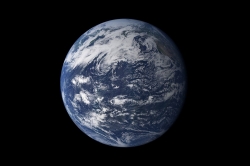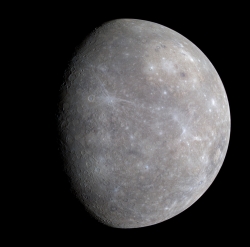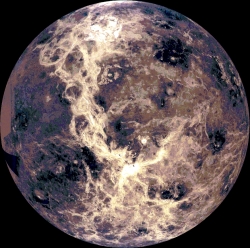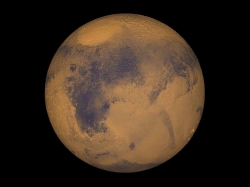You live in a large space neighborhood called the solar system. It has a sun in the middle, eight planets moving in circles around that sun, and rocks flying around. Some of these are made of gas. Some of them are made of rock. Today, let's get to know your rocking space neighbors.
Let's start with our part of the neighborhood.
Earth is the third planet from the sun and the only one that has life (that we know of). It sits just far enough from the sun to be hot enough for the air we need and for water to be liquid. This means it's the only planet in our solar system where there are plants and animals and beings like you that can think for themselves. It's also the only rocky planet that has a moon moving around it. I could go on and on about Earth, but we are here to get to know your neighbors. You already know Earth.

Earth, home sweet home.
NASA image by Robert Simmon and Marit Jentoft-Nilsen, based on MODIS data., Public domain, via Wikimedia Commons
Now throw on your tank top and some sunscreen. It's about to get warmer.
Mercury is the closest planet to the sun and this makes it a very dry and hot place. It's still 36 million miles away from the star, but that's close enough to burn the planet like a rock in a fire. During the day it's about 700 degrees Fahrenheit hotter here than on our planet and at night it's around 300 degrees Fahrenheit colder! Mercury is about the size of our moon and it has no gases moving around it. Because it's so close to the sun, one year on Mercury is only 88 days long. It's like hanging out in the desert, but hotter . . . and colder. We will not find any life here. Let's get out of this place, shall we?

Mercury looks more like a moon than a planet.
Put on your dark glasses. We are now coming to the brightest planet in our space neighborhood. Before we land, put on this rain jacket and hold your breath.
Venus is the second planet from our sun and is covered in lots of dense gases like carbon dioxide. It's just a little smaller than Earth but looks bigger because of all of the gases all around it. Most of this is basically the same type of gas that cars let out and you exhale. Are you still holding your breath? Good. Sorry about the rain eating through your jacket, but that's what this gas does when it is around water. Since all this the gas traps a lot of heat from the sun, Venus is 800 degrees hotter than Earth! It's like hanging out in fog. That is, a fog that can eat you. Okay, we're done here.

Venus is about the same size as Earth but way too hot to live on.
NASA, Public domain, via Wikimedia Commons
Skipping over our planet . . . goodbye, Earth! . . . we arrive at a small red planet.
Mars is the fourth planet from the sun and is very small and cold and red. Even though it appears to be very different than our planet, the two planets have quite a lot in common. Mars has polar ice caps just like Earth and seasons similar to ours. If Earth were the size of a basketball, Mars would be the size of a softball. Its days are a little over 24 hours long, almost like ours, and its years are 687 days, while ours are 365. This planet has more potential than any other in our solar system for alien life, but unfortunately we haven't discovered any yet. We could stay here for a long time looking for aliens, but there are already little rovers here that we sent to search for us.

Do YOU think there's life on Mars? I'm not so sure.
NASA, Public domain, via Wikimedia Commons
So these are your rocking neighbors. One is very small and hot with no air or gas. One is even hotter with poisonous gas and is about the size of Earth. Earth is the only planet that has life (that we know of) and is the only of the rocky planets that has a moon. Mars is a lot like Earth except that it's smaller, colder, and red. We have not found life on any of our space neighbors . . . yet. Maybe that's a good thing. Otherwise, you might have to tell your rocking space neighbors to keep it down.
References: Planets for Kids. "Earth" Planets for Kids, 2010. <
http://www.planetsforkids.org/planet-earth.html>
Planets for Kids. "Venus" Planets for Kids, 2010. <
http://www.planetsforkids.org/planet-venus.html>
Planets for Kids. "Mercury" Planets for Kids, 2010. <
http://www.planetsforkids.org/planet-mercury.html>
Planets for Kids. "Mars" Planets for Kids, 2010. <
http://www.planetsforkids.org/planet-mars.html>
http://www.ducksters.com/science/mars.phphttp://www.ducksters.com/science/venus.phphttp://www.ducksters.com/science/mercury.php